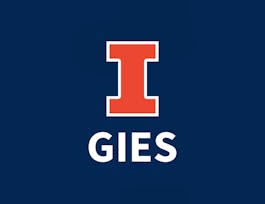This course will explore the theme of 'Authenticity' in leadership by introducing you to the history of leadership theory going back to Ancient Greece. We will establish how traditional leadership became so important. We will also explore how traditional leadership began to unravel when leadership went scientific. We explain how this new data-driven approach to leadership showed that leadership qualities alone do not explain leadership.



Data-Driven Leadership Skills Course 1: Leadership Narrative
This course is part of Data-Driven Leadership Skills Specialization

Instructor: Matt Offord
Sponsored by PKO BP
(10 reviews)
Recommended experience
What you'll learn
Critically evaluate, with particular reference to digital data, traditional leadership models
Analyse and assess leadership narratives and whether they help or hinder modern leaders in a digital age
Distinguish between agile and efficient leadership structures and their relationship to data
Describe and evaluate the role of collective decision making and agile teams
Details to know

Add to your LinkedIn profile
6 assignments
See how employees at top companies are mastering in-demand skills

Build your subject-matter expertise
- Learn new concepts from industry experts
- Gain a foundational understanding of a subject or tool
- Develop job-relevant skills with hands-on projects
- Earn a shareable career certificate


Earn a career certificate
Add this credential to your LinkedIn profile, resume, or CV
Share it on social media and in your performance review

There are 3 modules in this course
Before we can think about leadership in the 21st Century, the Information Age, we need to think about what people thought about leadership in the past. Why? Because the legacy of these ideas about leadership live on to a large extent. If you have any sort of leadership training, or perhaps read a book about leadership, the chances are you have been exposed to powerful narratives about heroic leaders and authority. Perhaps your current view of leadership is heavily stereotyped? Perhaps the organisation you work for prefers 'traditional' or 'old school' leadership. These paradigms still exert influence; sometimes for good and sometimes for bad. In any case, this module will explain where these views come from and what conditions leaders dealt with. This will help you to understand why we are still dealing with legacy leadership styles, how thet can help, and what new situations call for a different approach.
What's included
3 videos6 readings2 assignments4 discussion prompts
Some claim that leadership, as a concept, is in decline and may no longer be important. However, this may be a little premature or even naive. Leadership has always been important but authority and centralised decision-making are very recent, perhaps ephemeral, developments. As you move through this narrative of leadership, you will learn how leadership is changing. Due to the data deluge and hyper connected work places, high degrees of centralisation are becoming a thing of the past. Many firms are favouring more networked and less hierarchical approaches . Additionally, the introduction of social science in the 20th Century has radically shaken up some of the romantic ideas about leadership.
What's included
1 video6 readings2 assignments3 discussion prompts
So far we have explored the origins of traditional leadership and how this changed in the 20th Century. In the 21st Century we see the birth of a new business model: agility. Agility, like a lot of management and leadership ideas, has its roots in the military. The US military actively researched and developed ways of becoming more agile in the early 21st Century. Many other prominent military powers already embraced agility, especially in NATO. But what is agility and how does it relate to data? In this module, we will learn about agility in leadership.
What's included
2 videos5 readings2 assignments3 discussion prompts
Instructor

Offered by
Why people choose Coursera for their career




Learner reviews
10 reviews
- 5 stars
90%
- 4 stars
10%
- 3 stars
0%
- 2 stars
0%
- 1 star
0%
Showing 3 of 10
Reviewed on Dec 17, 2023
one of the best and most interesting topics by the professor. excellent execution of the programme and i was hooked on by the prof's innovative approach on this dry topic.
Reviewed on Nov 20, 2023
Awesome course. Please do a specialization in "Management" as well.
Recommended if you're interested in Business

University of Illinois Urbana-Champaign

The University of Notre Dame

Macquarie University

Kennesaw State University

Open new doors with Coursera Plus
Unlimited access to 10,000+ world-class courses, hands-on projects, and job-ready certificate programs - all included in your subscription
Advance your career with an online degree
Earn a degree from world-class universities - 100% online
Join over 3,400 global companies that choose Coursera for Business
Upskill your employees to excel in the digital economy


